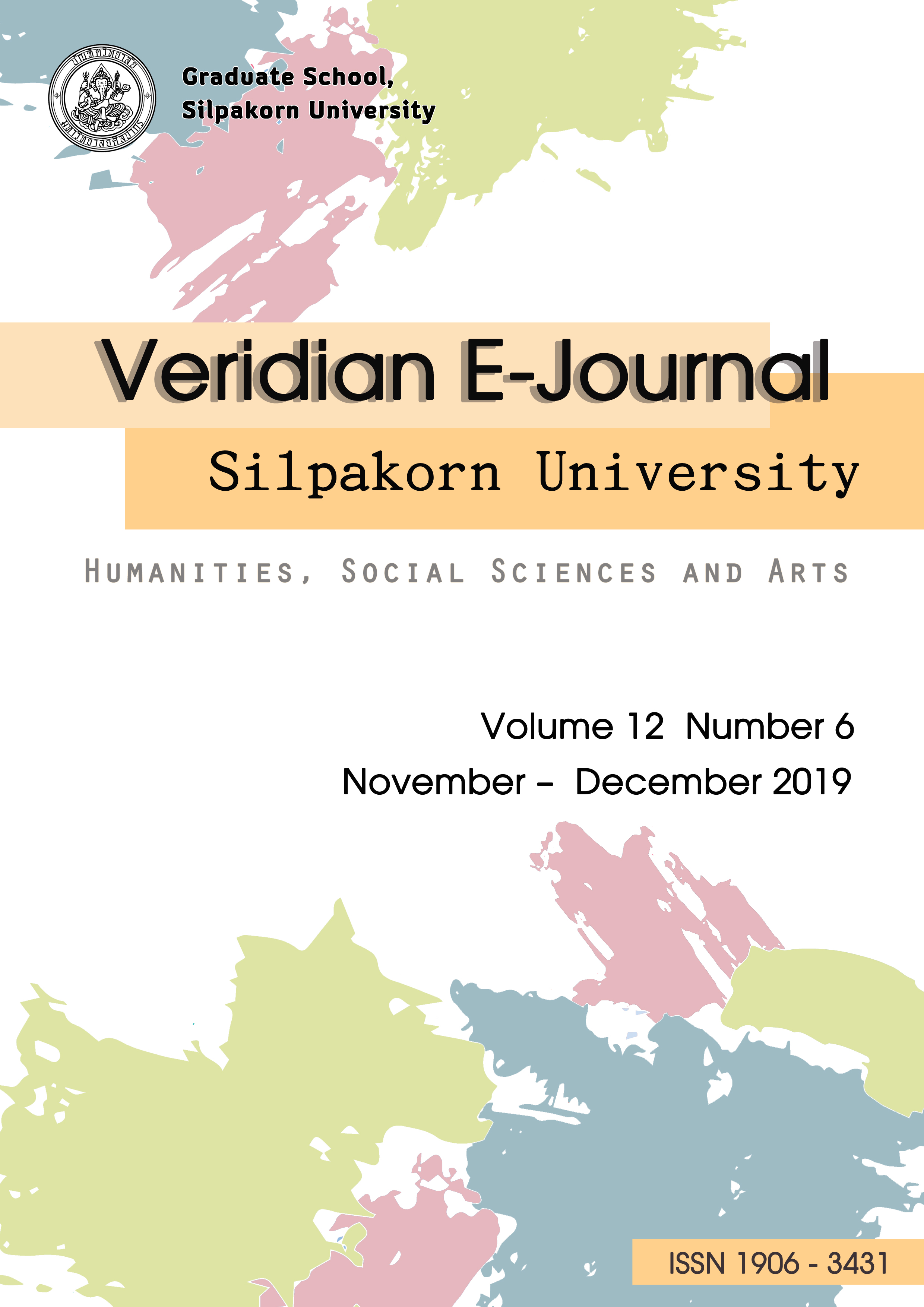ผลกระทบของการรับรู้ประโยชน์ใช้สอยทางสิ่งแวดล้อมและความโปร่งใสของนโยบายที่เป็นมิตรกับสิ่งแวดล้อมต่อการรับรู้คุณค่า การเชื่อมโยงตราสินค้า และความภักดีต่อตราสินค้าผู้ประกอบการที่เป็นมิตรกับสิ่งแวดล้อม (The Impact of Perceived Environmental Utility and Transparency of Environmental Friendly Policy on Perceived Value, Self-Brand Connection and Brand Loyalty with Eco-Friendly Entrepreneur)
Main Article Content
Abstract
การวิจัยครั้งนี้มีวัตถุประสงค์เพื่อศึกษาถึงผลกระทบของการรับรู้ประโยชน์ใช้สอยทางสิ่งแวดล้อมและความโปร่งใสของนโยบายที่เป็นมิตรกับสิ่งแวดล้อมต่อการรับรู้คุณค่า การเชื่อมโยงตราสินค้า และความภักดีต่อตราสินค้าผู้ประกอบการที่เป็นมิตรกับสิ่งแวดล้อม เครื่องมือที่ใช้ คือ แบบสอบถาม และตรวจสอบความเชื่อมั่นโดยการทดสอบค่าสัมประสิทธิ์ครอนบาคอัลฟ่า แบบสอบถามได้กระจายแก่กลุ่มตัวอย่างซึ่งเป็นผู้ที่มีประสบการณ์ในการซื้อสินค้าหรือบริการจากผู้ประกอบการที่เน้นนโยบายความเป็นมิตรกับสิ่งแวดล้อมของผลิตภัณฑ์ จำนวน 138 คน ขนาดของกลุ่มตัวอย่างกำหนดโดยใช้โปรแกรม G * Power (Version 3) เป็นเครื่องมือในการคำนวณ ด้วยระดับความเชื่อมั่นที่ร้อยละ 95 ใช้วิธีสุ่มตัวอย่างแบบง่าย ทำการวิเคราะห์ข้อมูลด้วยค่าสถิติต่าง ๆ ได้แก่ การแจกแจงความถี่ ค่าร้อยละ ทดสอบสมมติฐานด้วยการวิเคราะห์สมการถดถอย อย่างง่าย และการวิเคราะห์สมการถดถอยพหุคูณ
ผลการวิจัยพบว่า ความโปร่งใสของนโยบายที่เป็นมิตรกับสิ่งแวดล้อมเป็นปัจจัยสำคัญที่สุดที่ส่งผลเชิงบวกต่อการรับรู้คุณค่าตราสินค้าสีเขียว รองลงมาคือ การรับรู้ประโยชน์ใช้สอยทางสิ่งแวดล้อม ตามลำดับ และการรับรู้คุณค่าตราสินค้าสีเขียวยังเป็นปัจจัยสำคัญที่ส่งผลเชิงบวกต่อการเชื่อมโยงตราสินค้าเข้ากับผู้บริโภค นอกจากนี้ การเชื่อมโยงตราสินค้าเข้ากับผู้บริโภคยังเป็นปัจจัยสำคัญที่สุดที่ส่งผลเชิงบวกต่อความภักดีต่อตราสินค้าผู้ประกอบการที่เป็นมิตรกับสิ่งแวดล้อม รองลงมา คือ การรับรู้คุณค่าตราสินค้าสีเขียว ตามลำดับ ตัวแบบของผลการวิจัยสามารถอธิบายผลของการรับรู้คุณค่าตราสินค้าสีเขียว ได้ร้อยละ 65.10 (R2 = 0.651) การเชื่อมโยงตราสินค้าเข้ากับผู้บริโภค ได้ร้อยละ 61.10 (R2 = 0.611) และความภักดีต่อตราสินค้าผู้ประกอบการที่เป็นมิตรกับสิ่งแวดล้อม ได้ร้อยละ 66.80 (R2 = 0.668) จากผลการวิจัยเป็นประโยชน์ต่อผู้ประกอบการที่เน้นความเป็นมิตรกับสิ่งแวดล้อมของผลิตภัณฑ์ ในการเพิ่มระดับความภักดีต่อตราสินค้าของผู้บริโภค โดยผ่านการเชื่อมโยงตราสินค้าเข้ากับผู้บริโภคที่เกิดจากการรับรู้คุณค่าตราสินค้าสีเขียวด้านความโปร่งใสของนโยบายที่เป็นมิตรกับสิ่งแวดล้อม และการรับรู้ประโยชน์ใช้สอยทางสิ่งแวดล้อม ตามลำดับ
The main purposes of this study are to investigate the impact of perceived environmental utility and transparency of environmental friendly policy on perceived value, self-brand connection and brand loyalty with eco-friendly entrepreneur. The research instrument was a questionnaire and testing the reliability using coefficient alpha. The questionnaire was distributed to 138 samples that have experience in purchase goods or services from eco-friendly entrepreneur. The sample size was determined by using the G * Power program (Version 3) with a confidence level at 95 percent using simple random sampling. The data were analyzed through statistic methods such as descriptive statistics and test the hypothesis by using the simple regression analysis and multiple regression analysis.
The results showed that transparency of environmental friendly policy was the most influential factor affecting positive impact on green perceived value, followed by perceived environmental utility, respectively. And green perceived value had positive impact on consumers' self-brand connection. Moreover, consumers' self-brand connection was the most influential factor affecting positive impact on brand loyalty with eco-friendly entrepreneur, followed by green perceived value, respectively. Results of the research model could explain the green perceived value at 65.10 (R2 = 0.651), the consumers' self-brand connection at 61.10 (R2 = 0.611) and the consumers’ brand loyalty with eco-friendly entrepreneur at 66.80 percent (R2=0.668). The results of this research were beneficial to eco-friendly entrepreneur to increase consumers’ brand loyalty through the consumers' self-brand connection by green perceived value in transparency of environmental friendly policy and perceived environmental utility, respectively.

